#Talib Hussain
Explore tagged Tumblr posts
Text
The greatest warrior in history, Imam Ali (AS) never lost a battle, yet he never claimed victory in his entire life except once; At his martyrdom, the moment the sword was struck on his head in prayer, as he calls out;
“By the Lord of the Kaaba, I have succeeded.”

#imamali#death anniversary#17ramadan#19ramadan#warrior#islamic history#history#islamic#islam#shahadat#hazrat ali#masjid#blackday#marsiya#caliph#shia muslims#muslim#shia#iraq#syria#noha#martyrdom#maula ali#imam hussain#imam husayn#ali ibn abi talib#kaaba#holy kaaba#ya ali#karbala
39 notes
·
View notes
Text
1400 years ago Imam Hussaine was alone, seeking help, saying "Hal Min Nasirin Yansurna"
Today, Allah embedded his name in the hearts of Millions.
"Labbaik ya Hussain" till our last breath.
🏴🏴🏴
#muharram#2024#mustshare#sharethis#like and/or reblog!#islampost#islamdaily#welcome to islam#ahlulbait#ahlulbayt#imam hussain#ali ibn abi talib#prophet muhammad#share this post
18 notes
·
View notes
Text




Islam has existed in one form or another all along from the beginning and will continue to exist till the end of time.
#islam#peace#god#followers#life#essence#believe#prophet#religion#meaning#classification#misconceptions#believer#discrimination#instagram#facebook#twitter#tumblr#threads#ahlulbait#ahlulbayt#imams#imam ali#fatima#ali ibn abi talib#imam husayn#imam hussain#imam mahdi#imam mehdi#mahdi
3 notes
·
View notes
Text

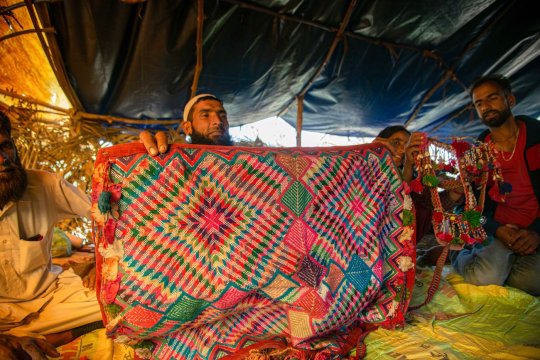
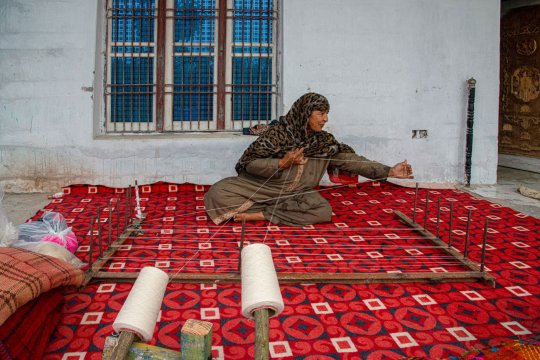
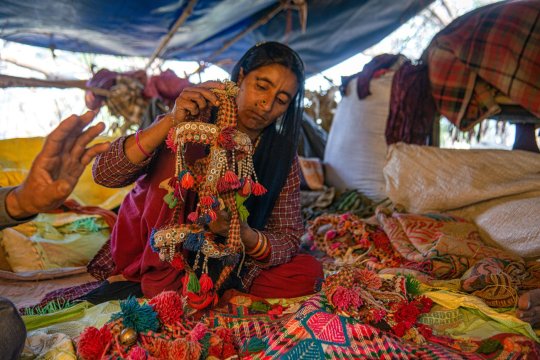
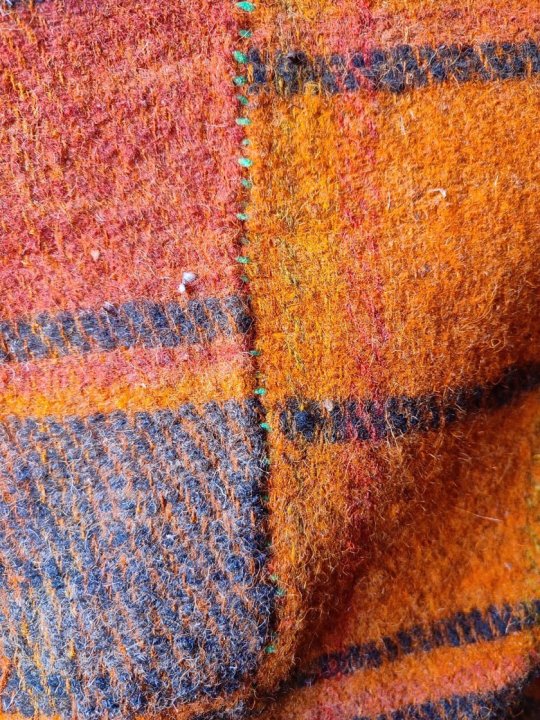
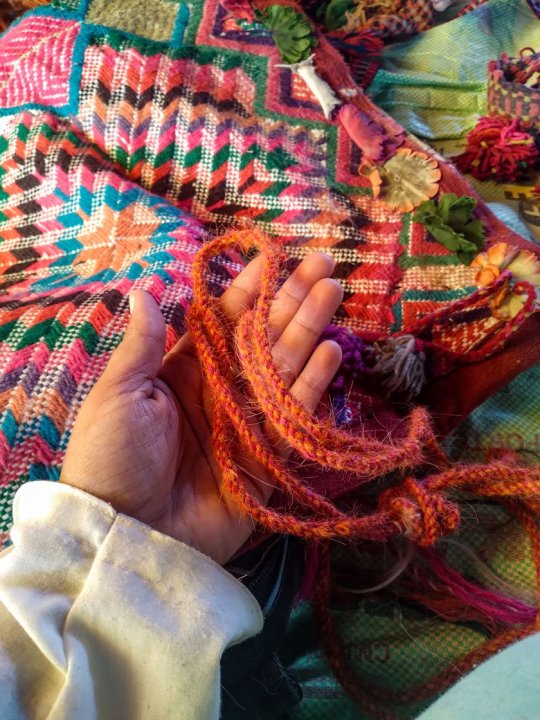
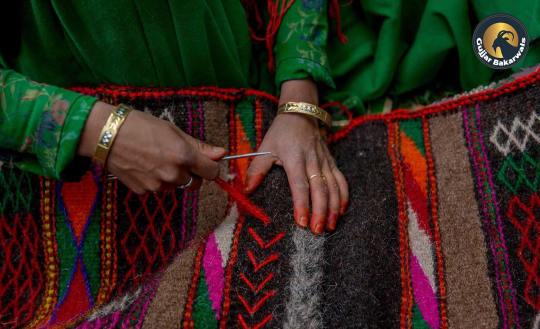


Bakarwal blankets: this pastoralist community makes them using wool from their animals. It has become almost impossible to continue with this beautiful and essential craft. Ritayan Mukherjee reports:
The woollen blankets are made by members of Scheduled Tribe communities – Megh and Mihngh, known for their wool craftsmanship. Once the blankets are made, they are washed and dried by the Bakarwal men. The thread and yarn for the blankets are usually made by Bakarwal women, and the yarn is dyed at home by Bakarwal families.
Mohammed Kalu has come from Khanna Chargal, a small settlement in a riverbed upstream from Pargalta. Pointing towards an old woollen blanket on which his little son is asleep he says, “[The blanket] lives as long as a human being or longer. But the market-bought acrylic wool blankets hardly last a few years.
He adds that blankets made of pachim (the local word for acrylic wool) take days to dry if they get wet, unlike pure woollen blankets. “Our feet burn and body aches after using the acrylic blankets in winter”.
“I can look at a quilt and tell you which family it comes from,” says Zareena Begum who lives in the same settlement as Talab Hussain.
“It is difficult to get people who still have mills,” says Maaz Khan. In his sixties, Khan is from a family that still processes wool. Many in the community say that the charkha (spinning wheel) is dead and have given up spinning.
As a result, pastoralists are also finding it difficult to sell wool. “We used to get at least 120-220 [rupees] for a kilogram but now we get nothing. A decade or so ago even the goat hair had a price in the market; now even sheep wool has no buyers,” says Mohammad Talib, a Bakarwal from tehsil Basohli, in Kathua district. The unused wool lies in their storerooms or is discarded at the shearing spot. The number of artisans working with wool has also reduced.
Maintaining a herd of animals for their wool is no longer easy as grazing grounds are scarce in and around Jammu. They also have to pay people whose land their animals graze on.
Recently a lot of areas around the villages in Samba district were taken over by invasive species, Lantana camara. “We can’t graze here. There are weeds everywhere,” says Munabbar Ali, resident of a small village in Basohli tehsil .
Many of the old breeds of animals have been replaced by the state and Bakarwal’s say that the current cross-bred sheep cannot stand the heat of the plains for too long, and neither can they navigate mountain paths, “When we migrate to Kashmir, they stop in their tracks if there is a small ledge as it is difficult for them to jump. The old breed would walk well,” Tahir Raza a shepherd told us.
https://ruralindiaonline.org/.../bakarwal-blankets-out.../
198 notes
·
View notes
Text
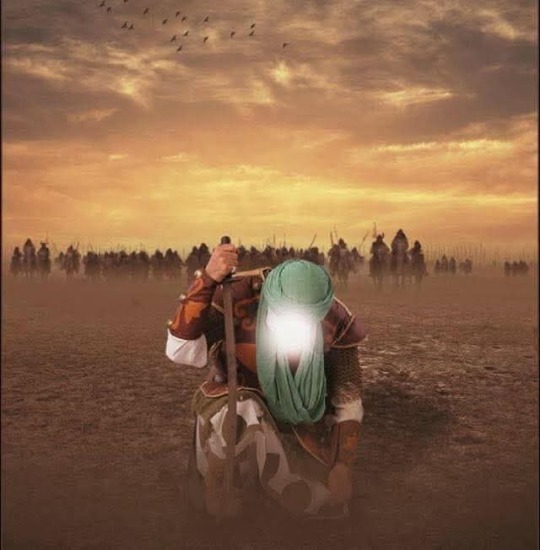
🍂🥀🍂 In the name and by the Grace of the Innocent Martyr Imam Hussain bin Ali bin Abu Talib (as), I beseech you, O Allah, to forgive us our sins and grant us peace in this world and in the hereafter, proximity to the Ma’sumeen (infallible ones) peace be on them.
🍂🥀🍂 Ameen 🍂🥀🍂
.
3 notes
·
View notes
Text
🍂🥀🍂 Imam Hussain (as) is reported to have said:
“I did not rise as (one who is) insolent, arrogant, a mischief-monger, or a tyrant. I have risen to reform the nation of my grandfather Prophet Muhammad (S). I wish to enjoin the good (al-amr bi al-maruf) and forbid the evil (al-nahi al-munkar), and to follow the way of my grandfather and father (Imam Ali ibn Abi Talib (as)”
🍂 Al-Shaykh al-Qarashi 🍂
(Hayat al-Hussain)
(vol. 1, pg. 11)
.
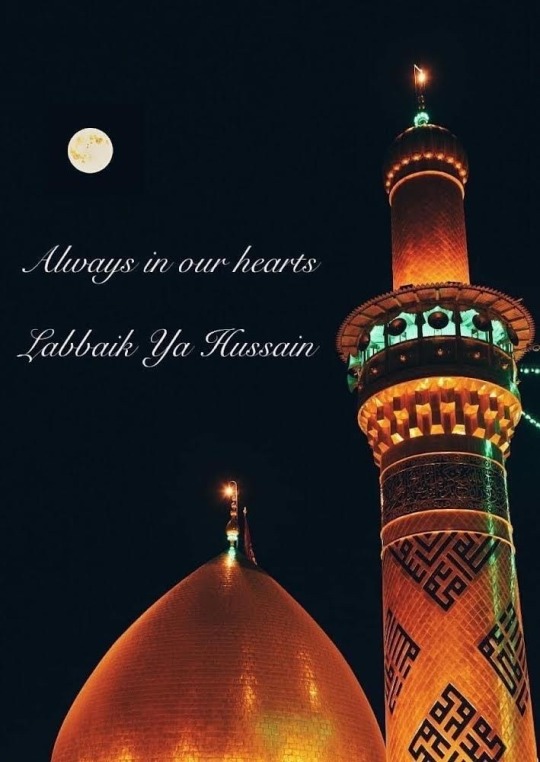
3 notes
·
View notes
Text

"The Caravan of Martyrs"
#2
The caravan takes a stop for Zuhrain Prayers. Hur has approached Imam Hussain (as) and is sitting close to him. Hazrat Abbas (as) is so vigilant that his eye is on the face of Imam Hussain (as) to notice even a slight discomfort and erase it or erase the one causing discomfort. This causes Hur to be more anxious when he talks about the aims of the present government.
He warns Imam Hussain (as) about the thirst of Yazid for Imam's blood. Hur says, "The issue of allegiance is just a bait to eradicate you. The fate is death for you Hussain (as) and it's better to give Yazid (la) what he wants because he seems eager to dye his hands in scarlet of your blood. If you accept I personally can ensure you "amaan" (safety) from the wrath of Yazid and Ibn e Ziyad."
Imam Hussain (as) replies, "May your mother cry in your grief (a phrase common in Arabs at that time). How can you be entitled to offer me safety and a chance to live in trade for an unworthy allegiance when life and death is a matter solely in the hands of Almighty? Do you think death can frighten Hussain (as) and deter Hussain (as) from the path of Allah (sat). By Allah (SWT) I will not leave the path of Allah (SWT) and my Grandfather the last Prophet (saww) and my father Ali Ibn e Talib (as) even if I have to quench the thirst of that hound with the last drop of my blood!"
The expression changes into something that triggers Hazrat Abbas (as) to approach Hur (as) faster than the blink of an eye and when he hears what Imam Hussain (as) responds his hands reaches his sword which immediately goes away from it when his eyes locks the eyes of Aba Abdillah (as). And he calls for Salah congregation (Jamat) for Zuhrain. Imam of Salah of course Imam Hussain (as) who leads and finishes the prayers with soulful recitation of Holy Quran. The peace that fills in Hur's heart immediately urges him to contemplate few questions.
"Why am I here and not there?" (with Yazidis battalion and not Hussaini caravan)
"Why my soul Is drawn to the innocence of Imam Hussain (as) while my whims lead me away from him?"
"Should the current Caliphate be justified to seek allegiance in this manner from the man who by far is superior in character, ancestral background, piety and knowledge than any man alive right now?"
"Why am I not satisfied with my own actions of chasing, following and threatening Imam Hussain (as)?"
The contemplation aggravates his anxiety and he shivers but the voice reaches his ears,
"Hussain (as) is from me and I am from Hussain (as)"
The hadith that his soul has just whispered is urging him to break free from the shackles and armours of the incumbent government but the choice is not easy and he is yet to proceed with what he truly wants. Hur (as) is undergoing the journey of emancipation and evolution which is a restless journey coming to completion soon on the break of dawn upcoming Ashura yet Hur (as) is not aware. Hur (as) is only carrying the dim torch of love and devotion for Imam Hussain (as) , safe keeping it from the eyes of government and Caliphate who are aspiring to turn this torch off if it exists anywhere at any cost.
Hur is yet to break free ...
Hur is still in 60 Hijri turmoil ...
#islam#islamic#karbala#imam hussain#heros of karbala#iraq#ghazi abbas a.s#abul fadhl abbas#i write maqtal#ya abbas
0 notes
Text

Zabawa kredą na asfalcie zamieniła się w eksperymentowanie, by sprawdzić jak duże są ślady.
To wywołało refleksję, że każdy z nas był/jest kiedyś dzieckiem.
Gdy jedna osoba jest młodsza, ktoś inny będzie starszy.
Przy temacie dzieciństwa, różnicy wieku i dzieci wokoło, możnaby zrobić mały konkurs. Sprawdzić czy pamiętamy, lub nasze dzieci umieją wymienić dzieci wokół Proroka Muhammada, salla allahu alayhi wa salam, przykłady sławnych Sahabah, którzy urodzili się w czasie misji Proroka Muhammada, lub krótko przed nią.
(O) Usamah ibn Zayed
Urodzony w Mekce w czwartym roku po rozpoczęciu się misji Proroka; syn Zayd ibn Haritha; wychowany w domu Proroka Muhammada, salla allahu alayhi wa salam. Prorok mówił o nim i o Al-Hassanie, synie Alego: „O Allah, kochaj ich, ponieważ ja ich kocham”.
(O) Abdullah ibn Omar ibn Al-Khattab
Przyjął islam, razem ze swoim ojcem, w szóstym roku misji Proroka, salla allahu alayhi wa salam. Miał wtedy około siedem lat. Dokonał migracji do Medyny przed swoim ojcem. Był znany ze staranności w podążaniu za aktami sunny.
(O) Abdullah ibn Abbas
Był kuzynem Proroka, salla allahu alayhi wa salam, urodzonym w Mekce trzy lata przed misją Proroka Muhammada. Razem ze swoim ojcem, wyemigrował do Medyny w ósmym roku Hidżry. Towarzyszył Prorokowi, salla allahu alayhi wa salam, przez dwa i pół roku, i później przekazał wiele wypowiedzi Proroka. Jako dziecko bardzo chętnie zdobywał wiedzę, był mądry i szybko się uczył. Już jako młoda osoba został wielkim uczonym.
(O) Zayed Ibn Thabit
Przyjął islam gdy był bardzo młody, a w wieku 11 lat dokonał emigracji z Mekki do Medyny. Jako młoda osoba chętnie brał udział w zdobywaniu wiedzy i walce na drodze Boga. Chciał brać udział w bitwie pod Badr i Uhud, ale Prorok się na to nie zgodził ze względu na jego wiek. Pierwsza bitwa, w której wziął udział to była Bitwa Rowu. Towarzyszył Prorokowi odkąd przybył do Medyny.
(O) Anas Ibn Malik
Urodził się dziesięć lat przed emigracją do Medyny. Kiedy Prorok wyemigrował do Medyny, Anas zaczął mu służyć. Dorastał więc pod nadzorem Proroka. Przekazał około dwa tysiące hadisów.
(O) Al-Hassan ibn Ali
Syn Ali ibn Talib oraz Fatimy Az-Zahra, która była córką Proroka Muhammada, salla allahu alayhi wa salam. Urodził się w trzecim roku Hidżry. Dorastał w częstym towarzystwie Proroka, i pod Jego okiem, który się z nim bawił, razem z jego bratem Al-Hussainem. Miał doskonałe maniery, był elokwentny, odważny i chojny.
(O) Al-Hussain ibn Ali
Urodzony w czwartym roku po Hidżrze. On i jego brat byli najukochańszymi osobami dla Proroka Muhammada, salla allahu alayhi wa salam.
Podobnie jak jego brat był odważny i miał zamiłowanie do jazdy konnej.
0 notes
Text
Ramadan Al-Karim
Month of Blessings month of mercy Month of extra salah month of fasting Welcome welcome welcome welcome We muslims ready to live ready to die O Allah we are present we are present Forgive us and our sins we are present Send your help to Palestine like Badr Accept martyre like Hamza and Hussain Give patience like time of Sheb Abi Talib O Allah give victory like victory of…
View On WordPress
0 notes
Text
Doda: 2 Dead, 1 Injured In Road Accident
Two persons were killed and another injured when a vehicle they were traveling in skidded off the road and fell into a 250-foot gorge in Doda district on Tanta-Gundna road. The deceased have been identified as Mir Ali, son of Noor of Kunthal and Zafarullah, son of Talib Hussain of Dandi Bala.
View On WordPress
0 notes
Text
He was called Kabir by the Indians,
Bitress by the Romans,
Bitreek by the Ethoptians,
Jubayr by the Persians,
Elia in the Bible,
Bariah in the Torah,
On the battle of Khaybar he introduced himself as Haider !
#yaali#ali ibn abi talib#imamali#13rajab#birth anniversary#najaf#karbala#iraq#shia muslims#shia#bible#torah#history#imam hussain#عراق#شیعہ#علی#امام علی#امام حسين#فاطمة الزهراء#fav#lit#foryou#fyp#tumblr fyp#explore#shia islam#eid#syria#hazrat ali
50 notes
·
View notes
Text

21,480,525 people marked Arbaeen in Karbala and yet the mainstream media is silent. Why?
Understanding the media's deafening silence and censorship of the Arbaeen Pilgrimage.
Typically, one of the primary factors that captures media attention is the scale of participation in public events. The larger the crowd, the greater the news coverage. But this principle seems to vanish when it comes to the annual Arbaeen pilgrimage - arguably the world’s largest peaceful gathering, with over 20 million participants.
If today's world comes to know the wonders of Arbaeen and its impacts, then you will see the people entering Islam in throngs, embracing the Shia School of Thought.
وَرَأَيۡتَ ٱلنَّاسَ يَدۡخُلُونَ فِي دِينِ ٱللَّهِ أَفۡوَاجࣰا
'And you see the people entering into the religion of Allah in multitudes'
[Surah Nasr - verse 2]
This might be one of the reasons why news about Arbaeen is so conspicuously censored.
Consider the contrast:
when protests or demonstrations involving a mere few hundred or thousand of people occur in global cities, news outlets are quick to provide extensive coverage. Reporters and journalists rush to cover events as varied as animal conservation efforts or minor local demonstrations.
Yet, when millions of pilgrims from across different faiths and nationalities converge for Arbaeen in Karbala, to commemorate the martyrdom of an infallible Imam (AS) and to reflect on his principles of justice, sacrifice, and coexistence, the mainstream media is eerily absent.
Why is it that a small protest in London or Paris makes headlines, but the world’s largest human gathering - where women, men, and children walk peacefully together - is largely ignored?
Arbaeen is more than just a religious pilgrimage. It’s a great spiritual journey, a form of jihad (struggle), and a powerful social movement centered around the legacy of an infallible Imam. There is a complete, divinely guided human figure at the core of this gathering. This unparalleled historical phenomenon is precisely why the news surrounding Arbaeen is often suppressed, especially in Western media.
In today’s world, dominated by consumerism and Western secularism, there is a growing crisis of spirituality and justice. As more people from diverse cultures and faiths seek balance and meaning in their lives, many are turning to Islam. This trend is causing increasing concern among non-Muslim governments, particularly in the West, where Islamophobic campaigns attempt to paint the entire Muslim community with the brush of extremism.
These same campaigns tend to spotlight radical ideologies, such as those of takfiri groups - movements often funded and fuelled by Western interests - and use them to generalise and distort the image of Islam as a whole.
In this context, Arbaeen emerges as a powerful counter-narrative. It showcases the true values of Islam: peace, sacrifice, justice, and co-existence. The millions who walk side by side during Arbaeen reflect the very opposite of the divisive images propagated by Islamophobia, demonstrating a message of unity and shared humanity that transcends all boundaries.
#arbaeen#make this blow up#make this go viral#mustshare#sharethis#must watch#ahlulbait#ahlulbayt#muharram#muharam#prophet muhammad#karbala#imam hussain#ali ibn abi talib#islampost#islamdaily#welcome to islam#like and/or reblog!#pls reblog#share this post#share if you can#pls share#like cmon#dontmissout#very interesting#very informative
7 notes
·
View notes
Text
अपने होटल में देवी-देवताओं की तस्वीर वाले अखबार में चिकन रखकर बेच रहा था शख्स, रोका तो...
अपने होटल में देवी-देवताओं की तस्वीर वाले अखबार में चिकन रखकर बेच रहा था शख्स, रोका तो…
Image Source : PTI (FILE PHOTO) Police Highlights लोगों की शिकायत पर पुलिस की एक टीम मौके पर पहुंची थी तफ्तीश के दौरान पुलिस दल पर चाकू से हमला किया गया देवी-देवताओं की तस्वीरों वाले अखबार की प्रतियां और चाकू बरामद UP News: उत्तर प्रदेश के सम्भल नगर में देवी-देवताओें की तस्वीरों वाले अखबार में चिकन रखकर बेचने से रोकने पर पुलिस दल पर चाकू से हमला करने के आरोप में एक होटल संचालक को गिरफ्तार किया…

View On WordPress
#attack on police team#cell chicken in newspaper#Chicken#god goddess photo#hindu god#Newspaper#Sambhal#sambhal nagar#sambhal nagar news#Talib Hussain#UP#Uttar Pradesh Hindi News#अखबार में चिकन#चिकन#पुलिस टीम पर हमला#पुलिस पर हमला#यूपी#संभल#हिंदू देवी देवता#हिंदू देवी देवता तस्वीर अखबार
0 notes
Text
Congress surrounded BJP over the arrest of terrorist Talib Hussain, asked questions by posting photos
Congress surrounded BJP over the arrest of terrorist Talib Hussain, asked questions by posting photos
Jammu Kashmir Terrorist Arrest: The Congress has targeted the BJP over the arrest of Lashkar-e-Taiba terrorist Talib Hussain in Jammu and Kashmir. In the case related to Talib Hussain, Indian Youth Congress National President BV Srinivas has tweeted some pictures. In which Talib is seen with some BJP leaders. Also, there is a letter in it, in which Talib Husain is said to be associated with BJP.…
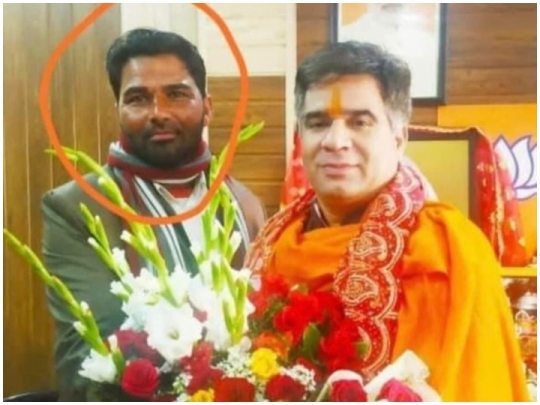
View On WordPress
#army#B J P#Biwi Srinivas#BJP#BJP IT Cell#BV Srinivas#Congress#J&K#jammu and kashmir#Jammu and Kashmir terrorist arrested#Jammu BJP#Jammu Kashmir#Jammu Kashmir Terrorist Arrest#JP Nadda#Lashkar-e-Taiba#LeT#princely#Reasi#Talib Hussain#terrorist
0 notes
Text

🍃🕊🍃 The Event of Mubahala
On 24th Dhu’l-Hijjah is a key event in Islamic history in which Prophet Muhammad (S) and Christian delegations from Najran met in order to do mubahala (imprecation-a confrontation where God’s curse is invoked on whichever side holds false beliefs) to reveal who is truthful and who is lying about their religious differences concerning divinity and monotheism.
The Christians accepted the challenge, however, on the day they had agreed upon earlier, they refused to proceed with imprecation since they saw that the Prophet (S) came with closest and purest members of his family, ONLY 4 of them; who were his daughter, Fatima al-Zahra (sa), his son-in-law, Imam Ali ibn Abi Talib (as), his grandsons, Hasan (as) and Hussain (as) , who represented the ‘women’, ‘self’, and ‘sons’ of the Holy Prophet (S).
This event marked a great victory for Islam and highlighted the exceptional position of Ahlul-Bayt (pbbuta), as relayed in the Quran verse 3:61.
“To those that argue with you concerning Jesus after the knowledge you have received say: ‘Come, let us gather our sons and your sons, our women and your women, ourselves and yourselves. We will pray together and call down the curse of Allah on every liar’.”
❁┈┈•⊰✿🤎✿⊱•┈┈❁
Recommended to fast and take a Ghusl (ritual bath) on this day.
Give charity to the needy on this day, emulating Imam Ali (as) charity of his ring whilst in rukuu (Quran 5:55)
Ziyarah of Imam Ali (as) recommended on this day.
Recite Ziyarah Jamia.
🍃🕊🍃 duas.org 🍃🕊🍃
.
2 notes
·
View notes
Text
🍂🥀🍂 Jabir b. Abdullah al-Ansari said,
When Allah revealed the verse:
“Obey Allah and obey the Apostle and those vested with authority among you..."onto His Prophet Muhammad (S) I said, O Messenger of Allah, we know Allah and His Messenger, but who are those vested with authority that Allah has associated their obedience with your obedience? He (S) said, O Jabir, they are my successors and the leaders of the Muslims after me. The first of them is Ali b. Abu Talib, then Hasan, then Hussain, then Ali b. al-Hussain then Muhammad b, Ali that is known in the Torah as al-Baqir then al-Sadiq, Ja'far b. Muhammad then Musa b. Ja'far then Ali b. Musa then Muhammad b, Ali then Ali b.Muhammad then Hasan b. Ali then my namesake and he whose nickname is as mine, the proof of Allah on His earth and His remainder among His servants the son of Hasan b.
🍂🥀🍂 Holy Prophet (S) 🍂🥀🍂
🥀 Kamāl al-Dīn wa Tamām al-Ni'ma 🥀
🍂 (vol. 1, pg. 253) 🍂
.
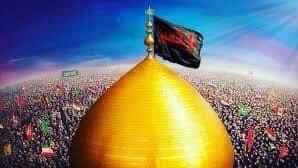
2 notes
·
View notes